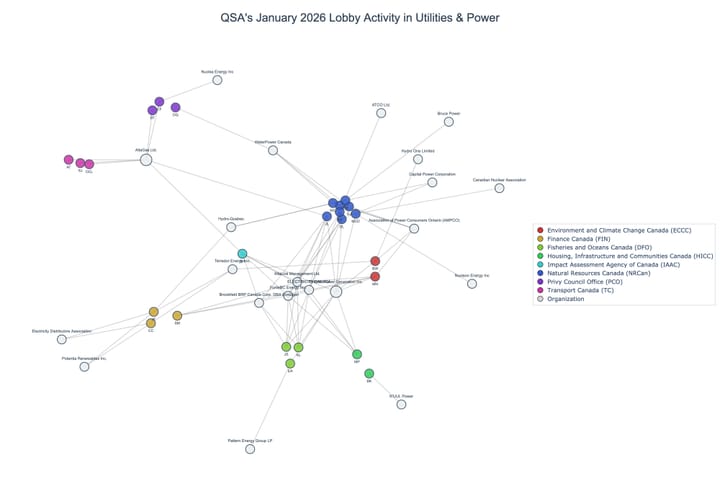QSA's Week in Utilities & Power (#17, 2025)
Primary energy output edges up; secondary energy production rises; B.C. accelerates renewables permitting; Alberta refers net-zero rules to court; Saskatchewan extends pipeline incentives.

Good morning! This is Queen Street Analytics' weekly roundup of regulatory developments, legislative discussions, political announcements, and other government-related news concerning power generation and transmission, wind and solar, utilities, midstream companies, batteries and energy storage, LNG, biofuels and nuclear. Every Monday, we break down the most important updates in this space in under five minutes.
Looking to elevate your organization’s presence or streamline your approach to government relations with more data-driven solutions? Queen Street Analytics is here to help you achieve your goals: faster, smarter, and more effectively. Let’s start the conversation. Reach us at contact@queenstreetanalytics.com to learn how we can support your success.
Start Date: 2025-04-27
End Date: 2025-05-03
Top Headlines
Main Stories
Primary and Secondary Energy Production Trends Hold Steady in February
Statistics Canada reported that in February 2025, primary energy production in Canada rose 0.1% year-over-year, with increases occurring in three of six energy sectors. Secondary energy production saw a 2.9% increase over the same period. These figures provide an updated snapshot of the national energy supply landscape and can be accessed at the official StatsCan portal. The data set includes breakdowns by fuel type and tracks both conventional and alternative sources, offering a quantitative baseline for energy sector performance.
Sources: Open Government Data Set: www.statcan.gc.ca
Provincial Announcements
B.C. Introduces Legislation to Centralize Permitting for Renewable Energy Projects
British Columbia introduced the Renewable Energy Projects (Streamlined Permitting) Act, proposing to make the BC Energy Regulator the primary authority for permitting wind, solar, and transmission projects, with the North Coast Transmission Line and nine wind projects named as initial priorities.
Sources: Provincial Announcement: news.gov.bc.ca
Alberta Refers Federal Net-Zero Electricity Regulations to Court
Alberta announced a legal challenge to the federal net-zero electricity regulations, citing concerns over reliability, cost impacts, and constitutional jurisdiction, referencing analysis from the Alberta Electric System Operator.
Sources: Provincial Announcement: www.alberta.ca
Saskatchewan Extends Oil Infrastructure Investment Program
Saskatchewan extended the Oil Infrastructure Investment Program to 2029, maintaining a 20% royalty tax credit for new oil and CO2 pipeline projects, and supporting further private capital investment in energy infrastructure.
Sources: Provincial Announcement: www.saskatchewan.ca
B.C. Releases Annual Climate Report
British Columbia published its annual Climate Change Accountability Report, noting stable emissions since 2007 and projecting a 20% reduction by 2030, with further measures under review.
Sources: Provincial Announcement: news.gov.bc.ca
B.C. Updates Zero-Emission Vehicle Program Status
British Columbia reported nearly 195,000 zero-emission vehicles on provincial roads and announced a pause to its Go Electric rebate program after May 15, 2025, pending a review of incentive strategies.
Sources: Provincial Announcement: news.gov.bc.ca
Alberta Refers Clean Electricity Regulations to Court of Appeal
The Alberta government passed an order referring constitutional questions regarding the Clean Electricity Regulations and related Canadian Environmental Protection Act provisions to the Alberta Court of Appeal.
Sources: Provincial Announcement: www.alberta.ca
Nova Scotia Supports Net-Zero Ready Affordable Housing
Nova Scotia announced completion of 20 new affordable housing units in Cumberland County, built to net-zero energy efficiency standards, with additional projects underway.
Sources: Provincial Announcement: news.novascotia.ca
What We're Reading This Week
- IPS to Highlight Renewable Solutions at CleanPower 2025: IPS outlines its approach to integrated renewable energy services at a major industry event.
- Blink Charging and Create Energy Launch On-Demand Storage: The companies debut a new turnkey storage product aimed at supporting grid resiliency.
- Quantum-Resistant Microcontrollers for Smart Grids: SEALSQ promotes new security technologies for modernized grid infrastructure.
- Battery Storage Project in Finland by Canadian Partner: Fluence is selected for a significant battery project, reflecting global trends in storage deployments.
- Micro Cap Stock Surges on Clean Energy Buy: A small-cap firm sees share gains after a clean energy asset purchase.
- Nuclear CEO Discusses Global Demand: Lightbridge’s CEO addresses nuclear’s place in the world energy mix.
- FERC Approves Settlement for Reliability Must Run Units: The U.S. regulator finalizes an agreement affecting reliability operations at Talen Energy plants.
- Tri-gen Project Receives U.S. Department of Energy Award: Tri-gen project is recognized by the U.S. Department of Energy for innovation.
- Micro Cap Rallies on Clean Energy Acquisition: Another report on micro-cap activity in the clean energy sector.


